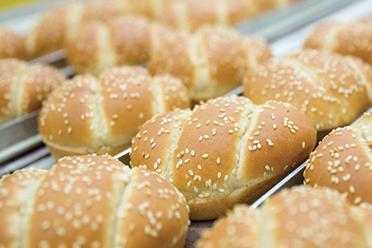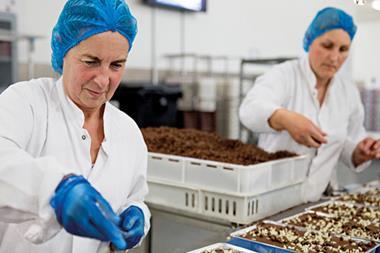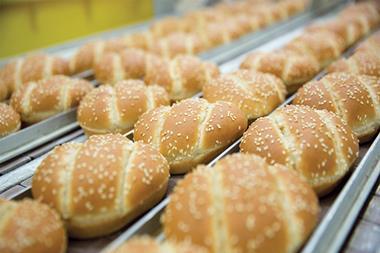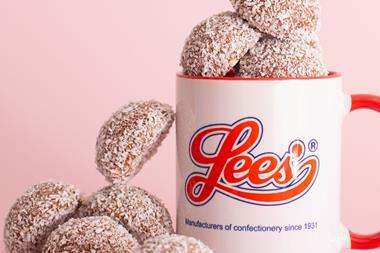
Top story
Bakery group Finsbury Food has boosted sales and profits as it adapted to the ongoing coronavirus pandemic and saw lost foodservice business begin to recover.
The supplier of cakes, bread and morning goods said the performance in the year ended 26 June reflected how resilient the group is and how well it can adapt in an environment of uncertainty.
Group revenues increased 2.3% to £313.3m in the year, with sales in the retail channel up 5.8%, while foodservice fell by 14.9%.
The foodservice side of the business, which accounts for 20% of total revenues, continued to show improvement as the hospitality industry emerged from lockdown, with sales in the second half up 4.6% compared with the prior year. Although, the recovery was slower than hoped as a result of the timings of the end of Covid restrictions.
The recovery helped second-half sales jump 9.1% in total, with the top line for the year approaching close to pre-pandemic levels.
Finsbury also reported significant growth in its overseas division, which increased 13.4% year on year.
An ongoing cost-reduction programme helped margins expand in the year, with group EBITDA up 2.5% to £26.9m and a 10.2% increase in adjusted pre-tax profits to £15.1m.
CEO John Duffy said: “It was incredibly pleasing to deliver such a robust financial performance with year-on-year revenue growth and a total sales figure almost at pre-pandemic levels, despite having to navigate such challenging circumstances over the period. We have continued to introduce new initiatives, in line with our ’Operating Brilliance Programme’, to enable the group to operate as a single, efficient organisation capable of scale execution.
“I would like to thank all our people across the group for their continued hard work, determination and commitment through what has been a testing time for many of them and their families. Without the determination of our committed workforce, we wouldn’t have been able to play a part in keeping food shelves stocked in the territories we serve and the whole team should be extremely proud of their contributions.
“Whilst we are likely to face persistent challenges around inflation and skilled labour and driver shortages, our long-term growth ambitions remain unchanged. We are committed to making Finsbury an even more efficient and joined-up business, focused on driving synergies and scale benefits across the group.”
Shares in the group increased 1.3% to 96.2p as markets opened this morning.
Morning update
Real estate investment firm Supermarket Income REIT has added six more supermarkets to its portfolio.
It purchased a Tesco in Prescot, two Morrisons in Durham and Cumbria, an Aldi in Oldham and an Aldi and M&S Foodhall site in Liverpool for a total price of £113.1m.
The Tesco in Merseyside is being acquired from an undisclosed vendor for £50m. Tesco has operated from the store since 1993, which was redeveloped in 2010. The 7.5-acre site comprises an 89,000 sq ft net sales area supermarket, a 12-pump petrol filling station and 496 car parking spaces. The store also has a purpose-built online fulfilment centre, which operates 12 vans, supporting Tesco’s online grocery network across the region. It is being acquired with an unexpired lease term of 15 years, with annual, upwards only, CPI-linked rent reviews.
The Morrisons in Durham was acquired from Janus Henderson UK Property PAIF for £18.4m. The store was developed in 2016. The 7.5-acre site comprises a 50,000 sq ft net sales area supermarket, a 16-pump petrol filling station and 475 car parking spaces. The store has several purpose-built online fulfilment docks making it a key part of Morrisons’ online grocery fulfilment operations across the region. It is being acquired with an unexpired lease term of 20 years, with five-yearly, upwards only, RPIX-linked rent reviews.
The Morrisons in Workington was acquired from Land Securities Group plc for £28.9m. Morrisons has operated from the store since 2004, which was fully refurbished in 2019. The 13.7-acre site comprises a 35,000 sq ft net sales area supermarket, an eight-pump petrol filling station and 605 car parking spaces. The store offers online grocery click and collect. The acquisition includes 5 adjoining non-food units. The Morrisons supermarket has an unexpired lease term of 17 years, with 5-yearly, upwards only, CPIH-linked rent reviews.
The Aldi in Oldham was acquired from O.P.P Investments for £5.6m. The one-acre site comprises a 13,000 sq ft net sales area supermarket, which was developed in 2011 and 108 car parking spaces. The store is being acquired with an unexpired lease term of 10 years, with five-yearly, 2.0% fixed, annually compounded uplifts.
The Aldi and M&S Foodhall in Liverpool was acquired from London Metric Property for £10.2m. Developed in 2016, the 1.7-acre site comprises a combined 23,000 sq ft net sales area with 120 car parking spaces. The Aldi supermarket has an unexpired lease term of 15 years, with five-yearly, 2.5% fixed, annually compounded uplifts. The M&S Foodhall has an unexpired lease term of 10 years, with five-yearly, open market rent reviews.
Ben Green, Director of Atrato Capital, the investment advisor to Supermarket Income REIT, said: “These acquisitions provide geographic and tenant diversification, with the purchase of our first M&S Foodhall, as well as exposure to a number of high-quality omnichannel supermarket assets.”
Consumer goods brands group Ultimate Products has signed a license brand endorsement with WW, formerly known as Weight Watchers.
The endorsement will see Ultimate’s kitchenware brand Progress and WW collaborate to develop and promote “value-for-money products” that can help to prepare and cook nutritious and healthy foods. A range of ‘Progress by WW’ products will be launched across the small domestic appliances and cookware categories. These will include air fryers, health grills, soup makers, nut milk makers, slow cookers, blenders, food processors, food steamers, chopping boards, knives, utensils, and kitchen gadgets.
Progress by WW products will be sold through Ultimate Products’ established channels of retailers, supermarkets, online platforms and discounters, and will also be available to WW members through the WW website.
Progress was acquired by Ultimate Products in 2015 and relaunched in 2016. Its customers include Tesco, Argos and Amazon.
Ultimate CEO Simon Showman said: “We are thrilled to be partnering with a brand of WW’s global renown, heritage and standing. Their endorsement of the historic Progress brand is a fantastic seal of approval, and we are delighted that ‘Progress by WW’ will help to inspire people to choose a healthier lifestyle.”
The FTSE 100 started the week by falling 1.2% to 6,880.90pts.
Early fallers in the food and drink market included Naked Wines, down 6.8% to 770p, Ocado Group, down 3.3% to 1,643.5p, and Science in Sport, down 3.2% to 76p.
Risers included Unilever, up 1% to 3,957p, Sainsbury’s, up 0.6% to 284p and Nichold, up 0.6% to 1,385.2p.
This week in the City
It is looking a little quieter in the City this week in terms of scheduled updates.
Tomorrow brings the latest monthly stats on the grocery sector from Nielsen, as well as a trading update from catering giant Compass.
Personal care firm PZ Cussons reports its full-year results on Wednesday morning, while over in the US, General Mills releases quarterly figures.
The week ends with the monthly GfK consumer confidence index.



















No comments yet